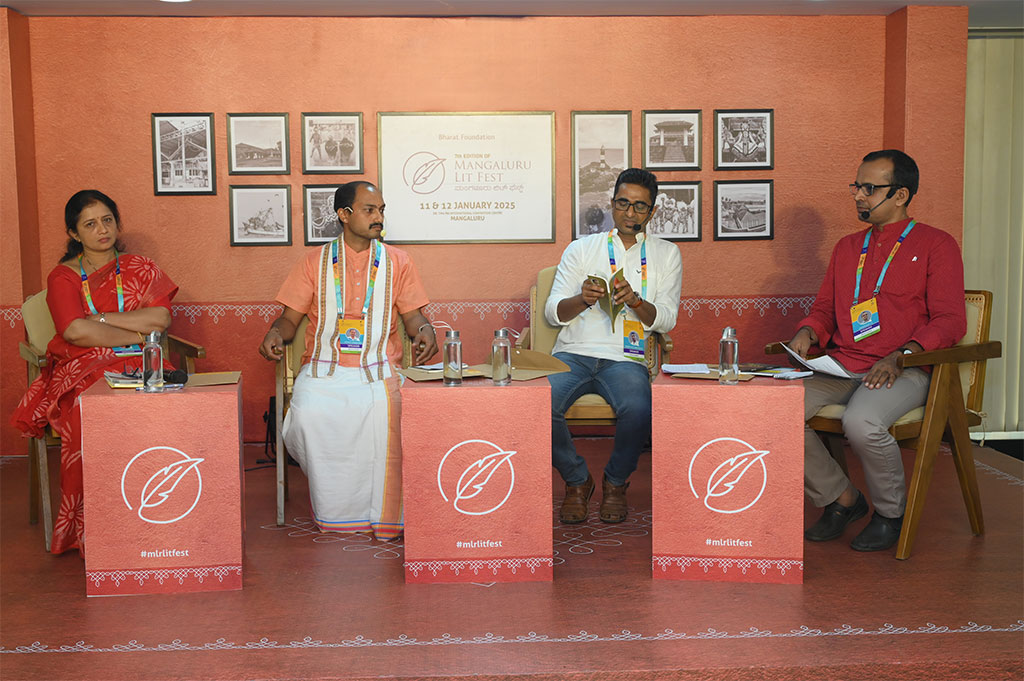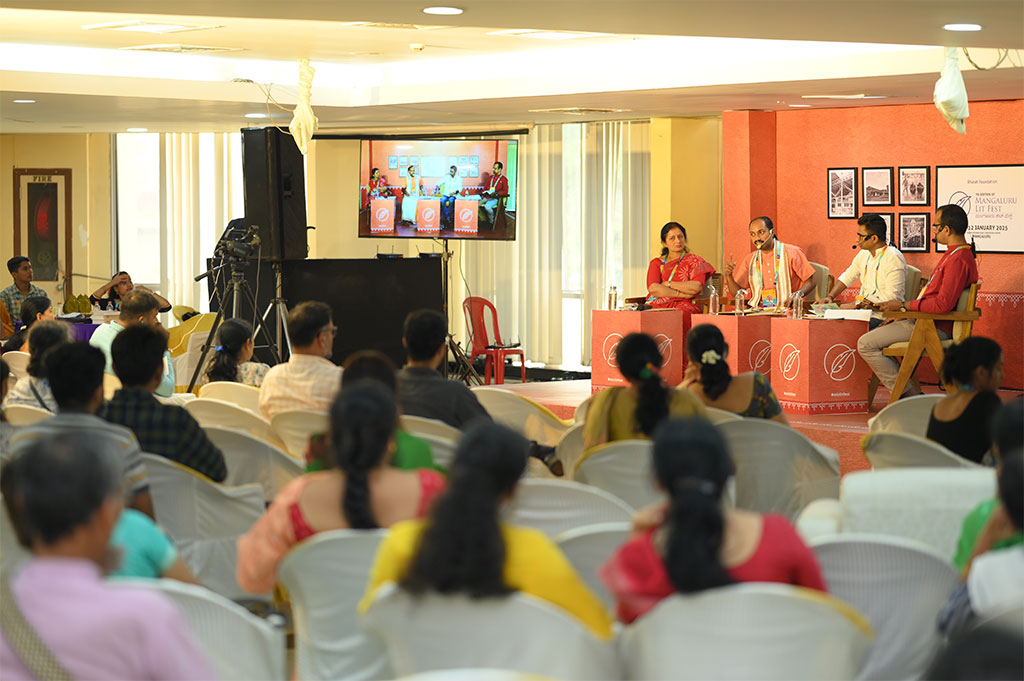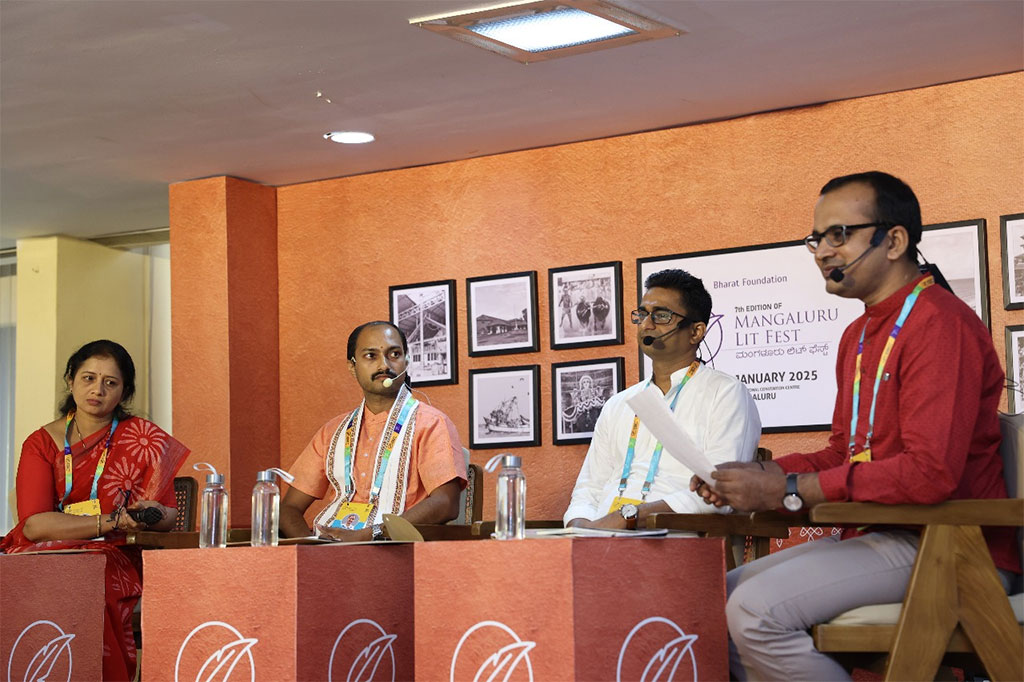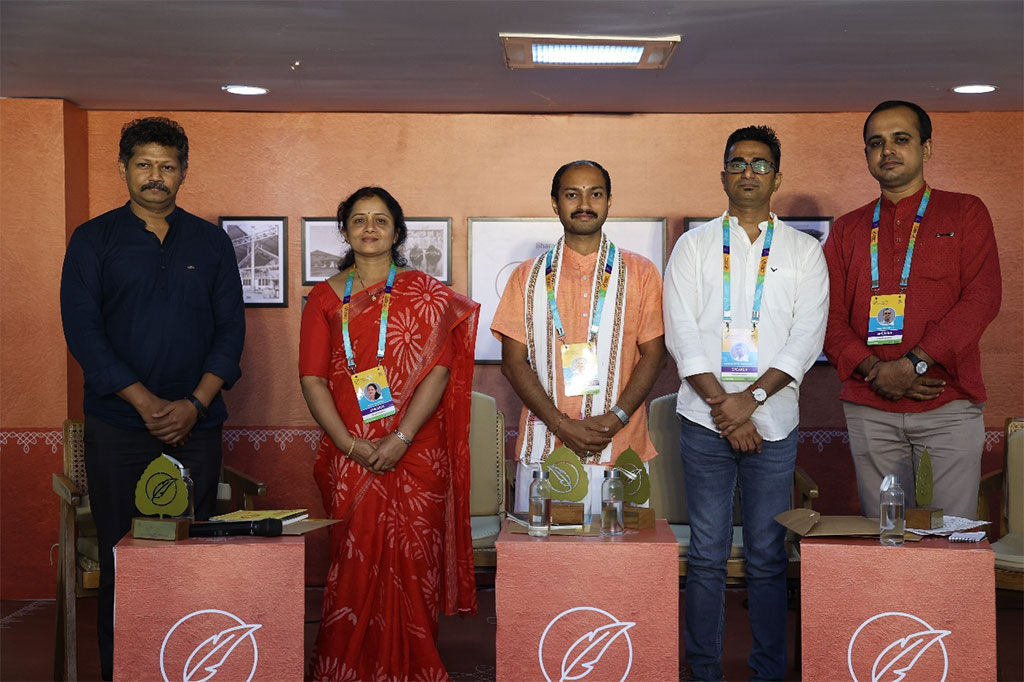Day 2 | Audi 2 – Session 5 : 3.00 pm
ಸತೀಶ ಹೆಗಡೆ ಶಿರಸಿ, ರವೀಂದ್ರ ನಾಯಕ್ ಸಣ್ಣಕ್ಕಿಬೆಟ್ಟು, ಸ್ಮಿತಾ ಅಮೃತ್ರಾಜ್ ಮತ್ತು ಗುರುಪ್ರಸಾದ್ ಟಿ. ಎನ್.
ವೇದಿಕೆಯಲ್ಲಿದ್ದ ಕವಿಗಳ ಸಾಲಿನಲ್ಲಿ ಒಬ್ಬರು ರವೀಂದ್ರ ನಾಯಕ್ ಸಣ್ಣಕ್ಕಿ ಬೆಟ್ಟು ಅವರು ಸಮಕಾಲೀನ ಸಾಹಿತ್ಯದ ಒಬ್ಬ ಕವಿ. ಈಗಾಗಲೇ ಯಶಸ್ಸನ್ನ ಪಡೆದಂತಹ ಕವಿ, ಮುಸುಕು ತೆರೆದು, ತೂಗು ದೀಪ, ಇರುವುದೆಲ್ಲವ ಬಿಟ್ಟು, ನೆಮ್ಮದಿ ಸಿಕ್ಕಿದೆ ಬದುಕಿಗೆ ಈ ಕವನ ಸಂಕಲನಗಳನ್ನ ವಿರಚಿಸುತ್ತಾರೆ. ನೆಮ್ಮದಿ ಸಿಕ್ಕಿದೆ ಬದುಕಿಗೆ, ಬದುಕಿಗೆ ಭಾವಗೀತೆಗಳ ಸಂಕಲನ, ಶರದಿಗೆ ಆಕಾಶ ಬುಟ್ಟಿ ಮತ್ತು ಒಲವ ಶ್ರಾವಣ ಅನ್ನುವಂತಹ ಮೂರು ಭಾವಗೀತೆಗಳ ಧ್ವನಿ ಸುರುಳಿ ಸೇರುತ್ತದೆ. ಇವರ 50 ಭಾವಗೀತೆಗಳನ್ನ YouTube ನಲ್ಲಿ ಕೇಳಬಹುದು. ಅವರದೇ ಹೆಸರಿನ YouTube ಚಾನಲ್. ಅವರ ಹಾಡುಗಳನ್ನ ಜನಪ್ರಿಯ ಹಾಡುಗಾರರು ಗಣೇಶ ದೇಸಾಯಿ, ರಾಘವೇಂದ್ರ ವೀಜಯಡಿ, ಸುಪ್ರಿಯ ಅರು ನಂದನ್, ಎಂಡಿ ಪಲ್ಲವಿ, ರಘು ದೀಕ್ಷಿತ್ ಹಾಡುಗಳನ್ನ ಹಾಡಿದ್ದಾರೆ. ಅವರದ್ದೇ ಒಂದು ತಂಡವು ಕೂಡ ಇದೆ. ಕಿಟಕಿಗಳ ಆಚೆ ಅನ್ನುವಂತಹ ಲಲಿತ ಪ್ರಭಂಧ ಸಂಕಲನವನ್ನ ಕೂಡ ಅವರು ಬರೆದಿದ್ದಾರೆ. ವಾಸಂಸಿ ಜೀರ್ಣಾನಿ ಅನ್ನುವಂತಹ ಮರಾಠಿ ನಾಟಕವನ್ನ ಕೊಂಕಣಿಗೆ ಅನುವಾದ ಮಾಡಿದ್ದಾರೆ. ಚರಣ ಚಿತ್ರಗಳು, ಕೊಂಕಣಿ ಚಿತ್ರ ಅಂಚೆ ಸಂಸಾರ, ಲೈಟ್ಹೌಸ್ ಅನ್ನುವಂತಹ ಎರಡು ಚಲನಚಿತ್ರಗಳಲ್ಲಿ ತಲಾ ಮೂರು ಹಾಡುಗಳನ್ನ ಇವರು ಬರೆದಿದ್ದಾರೆ. 2014 ರ ಮಹಾಸಾರಿನ ಮೈಸೂರು ದಸರಾ ಕವಿಗೋಷ್ಠಿ ಸೇರಿದಂತೆ ರಾಜ್ಯ ಮಟ್ಟದ ಅನೇಕ ಕವಿಗೋಷ್ಠಿಗಳಲ್ಲಿ ಅವರು ಭಾಗವಹಿಸುತ್ತಾರೆ.




ಸತೀಶ್ ಹೆಗಡೆ ಶಿರಸಿ, ಉತ್ತರ ಕನ್ನಡ ಜಿಲ್ಲೆಯ ಶಿರಸಿ ತಾಲೂಕಿನ ಹುಣಸಿ ಮಕ್ಕೆ ಎಂಬ ಹಳ್ಳಿಯವರು. ಮಂಗಳೂರಿನ ಪದವಿಪೂರ್ವ ಶಿಕ್ಷಣ ಮತ್ತು ಬೆಂಗಳೂರಿನಲ್ಲಿ ಇಂಜಿನಿಯರಿಂಗ್ ಪದವಿ ಪಡೆದಿದ್ದಾರೆ. ಶಿರಸಿಯಲ್ಲಿ ಇದ್ದು, ಸಾಫ್ಟ್ವೇರ್ ಕಂಪನಿಯಲ್ಲಿ ದುಡಿಯುತ್ತಿದ್ದಾರೆ. ಅವರ ಸಾಹಿತ್ಯ, ಸಂಗೀತ ಕಲಾ ಶಕ್ತಿ ಅವರಿಗೆ ಶತಾವಧಾನಿ ಗಣೇಶ ಅವರಿಂದ ಸ್ಫೂರ್ತಿಯನ್ನ ಪಡೆದು ಛಂದೋಲಯ ಪದ್ಯಗಳನ್ನ ಬರೆಯುತ್ತಾರೆ. ಛಂದೋಲಯ ಪದ್ಯಗಳ ಶೃಂಗಾರ ಶರದಿ ಅನ್ನುವಂತಹ ಪುಸ್ತಕ ಅನ್ನ ಬರೆದಿದ್ದಾರೆ.
ಸ್ಮಿತಾ ಅಮೃತರಾಜ, ಲಲಿತ ಪ್ರಬಂಧಗಳಲ್ಲಿ ಸಾಹಿತ್ಯದಲ್ಲಿ ತೊಡಗಿಸಿಕೊಂಡಿದ್ದಾರೆ. ದಲಿತ ಪ್ರಬಂಧ, ಕವನ ಸಂಕಲನ ಪುಸ್ತಕ ಬರವಣಿಗೆ ಸೇರಿದಂತೆ ಒಟ್ಟು ಒಂಬತ್ತು ಪುಸ್ತಕಗಳು ಪ್ರಕಟಗೊಂಡಿವೆ. ಕಾಲ ಕಾಯುವುದಿಲ್ಲ, ತುಟಿ ಎಂಚಿನಲ್ಲಿ ಉಳಿದ ಕವಿತೆಗಳು, ಮಾತು ಮೀಟಿ ಹೋಗುವುದು, ಅವರೇ ಚಪ್ಪರದ ಹಾಡು ಇವು ಅವರ ಕವನ ಸಂಕಲನಗಳು. ಅಂಗಲ ದಂಚಿನ ಕನವರಿಗೆಗಳು, ಒಂದು ವಿಳಾಸದ ಹಿಂದೆ, ನೆಲದಾಯ ಪರಿಮಳ ಅನ್ನುವಂತಹ ಮೂರು ಲಲಿತ ಪ್ರಬಂಧಗಳನ್ನ ಬರೆದಿದ್ದಾರೆ. ಹೊತ್ತಗೆ ಹೊತ್ತು ಅನ್ನುವಂತಹ ಪುಸ್ತಕ ಪರಿಚಯವನ್ನ ಬರೆದಿದ್ದಾರೆ.
ಗೋಷ್ಠಿಯಲ್ಲಿ ಮೊದಲು ಮಾತನಾಡಿದ ರವೀಂದ್ರ ನಾಯಕ್ ಅವರು ಕಾವ್ಯ ಅನ್ನೋದು ಬುದ್ಧಿಗಿಂತ ಹೆಚ್ಚಾಗಿ ಹೃದಯಕ್ಕೆ ಸಂಬಂಧಪಟ್ಟದ್ದು. ಕಾವ್ಯ ಸೃಷ್ಟಿ ಕೂಡ ಹಾಗೆ ಬಹಳ ಅನೂಹ್ಯ ವಿಸ್ಮಯವಾಗಿ ನಮಗೆ ಕಾಣುವಂತದ್ದು, ಬಹಳ ಆಪ್ತವಾಗಿರುವಂತದ್ದು, ಏಕಾಂತದಲ್ಲಿ ಹುಟ್ಟುವಂತ ಒಂದು ಪ್ರಕ್ರಿಯೆ. ಮತ್ತು ಹೆಚ್ಚಾಗಿ ಬಹಳ ಖಾಸಗಿಯಾಗಿರುವಂತ ಒಂದು ಪ್ರಕ್ರಿಯೆ ಅಂತ ಅಂದುಕೊಳ್ತೇನೆ ಎಂದು ಹಂಚಿಕೊಂಡರು.
ಇದರೊಂದಿಗೆ ಹಲವಾರು ಕವಿತೆಗಳನ್ನು ಓದಿದ ರವೀಂದ್ರ ಸ್ವಾರಸ್ಯವಾಗಿ ಮುರಳಿಯ ಪ್ರಾಣ ಮತ್ತು ರಾಧೆಯ ಪ್ರೇಮ ಸುಲಭವಾಗಿ ದಕ್ಕುವುದೆಂದರೆ ಯಾರು ನಂಬುವ ಮಾತಲ್ಲ. ಅಷ್ಟಕ್ಕೂ ಈ ಮೋಹದ ಲೋಕದಲ್ಲಿ ಗೊಲ್ಲನೊಬ್ಬ ಕೃಷ್ಣನಾಗುವುದೆಂದರೆ ಅದು ಅಷ್ಟು ಸುಲಭದ ಮಾತಲ್ಲ ಎಂದು ವಿವರಿಸಿದರು.
ಸತೀಶ್ ಹೆಗಡೆ ಶಿರಸಿ, ಮಲೆನಾಡಿನ ಒಂದು ಸ್ಥಿತ್ಯಂತರ ಕಾಲಗಟ್ಟಕ್ಕೆ ಅವರ ತಲೆಮಾರು ಸಾಕ್ಷಿಯಾಯ್ತು. ಮಲೆನಾಡಿನ ಸತ್ಯ ವರ್ತಮಾನದ ಜಂಜಾಟ ಏನು ಎಂದು ಇವರು ಆಳವಾಗಿ ಅರ್ತಿರುವವರು. ಬಹುತೇಕ ನಮ್ಮ ದೇಶದಲ್ಲಿ ವಾತಾವರಣ ಹೇಗೆ ನಿರ್ಮಾಣವಾಗಿದೆ ಎಂದು ನೋಡಿದಾಗ ಎಲ್ಲರೂ ಗ್ರಾಮವನ್ನು ತೊರೆದು ಶಹರಕ್ಕೆ ಹೋಗುವಂತಹ ಪ್ರಕ್ರಿಯೆ ಪ್ರಾರಂಭವಾಯ್ತು. ಮಲೆನಾಡು ಗ್ರಾಮೀಣ ಪ್ರದೇಶ ಹೇಗೆ ದಶರಥನಿಗೆ ನಾಲ್ಕು ಜನ ಮಕ್ಕಳಿದ್ದರೂ ಸಾಯುವ ಕಾಲದಲ್ಲಿ ಅವರು ಒಬ್ಬರು ಇರಲಿಲ್ಲವೋ ಈ ಪರಿಸ್ಥಿತಿ ಗ್ರಾಮೀಣ ಭಾಗದಲ್ಲಿ ಆಗುತ್ತಿದೆ. ಆ ಸಂದರ್ಭವನ್ನ ನೋಡಿ ಈ ಪದ್ಯ ಹುಟ್ಟಿತ್ತು ಎಂದು ಹೇಳಿದರು.ಇಂತಹ ಸಂದರ್ಭದಲ್ಲಿ ಹಳ್ಳಿಗಳ ಪರಿಸ್ಥಿತಿಯ ಬಗ್ಗೆ ಇವರು ತಮ್ಮ ಕವಿತೆಗಳಲ್ಲಿ ವಿಷಾದ ವ್ಯಕ್ತಪಡಿಸಿದ್ದಾರೆ.
ನಂತರ ಮಾತನಾಡಿದ ಸ್ಮಿತಾ ಅವರು ತಮ್ಮ ಜೀವನ ಸಾದಾ ಸೀಮಿತವಾಗಿ ಸಾಗುವುದೆಂದು ಅನಿಸಿತ್ತು. ಅತ್ತ ನಾಮಕರಣ, ಮದುವೆ – ಇ?ರಲ್ಲೇ ಜೀವನ ಸೀಮಿತವಾಗುತ್ತದೆ ಎಂದು ಭಾಸವಾಗಿತ್ತು. ಆದರೆ ಆಸಕ್ತಿ, ಅಭ್ಯಾಸ ಬೇಕೆಂದು ಮನಸ್ಸಾಯಿತು. ಅವರು ತಮ್ಮನ್ನು ಬರವಣಿಗೆಯ ಮೂಲಕ ಗುರುತಿಸಿಕೊಳ್ಳಲು ತೊಡಗಿದರು. ಬರಹ ಪತ್ರಿಕೆಗಳಲ್ಲಿ ಪ್ರಕಟವಾದಾಗ ಜನರು ಅವರನ್ನು ಗುರುತಿಸಲು ಪ್ರಾರಂಭಿಸಿದರು. ಅದರಿಂದ ಅವರಿಗೆ ನಿಜವಾದ ಅಸ್ತಿತ್ವ ಸಿಕ್ಕಂತಾಯಿತು. ಪೆರಾಜೆ ಎಂಬ ಕೊಡಗಿನ ಹಳ್ಳಿ ಮೂಲದಿಂದ ಈ ದಿನ ಕಾರ್ಯಕ್ರಮಗಳಲ್ಲಿ ಭಾಗಿಯಾಗುತ್ತಿರುವುದು ಅವರ ಅಕ್ಷರದ ಪ್ರಯತ್ನದಿಂದ ಸಾಧ್ಯವಾಯಿತು ಎಂದು ಅವರು ಭಾವಿಸುತ್ತೇನೆ.
ನಂತರ ತಮ್ಮ ಕವಿತೆ ಓದಿದ ಇವರು ಅದರ ಆಶಾಯವನ್ನು ತಿಳಿಸಿದರು. ಈ ಸಾಯುವ ಕಾಲದಲ್ಲಿ ಜಾಗ ನಮಗೆ ಭೌತಿಕವಾಗಿ ನಮ್ಮ ಕಣ್ಣಿಗೆ ಏನು ಕಾಣುತ್ತದೋ ಆ ಸಾಯುವ ಕಾಲದಲ್ಲಿ ಜಾಗ ಅಲ್ಲ. ಬಹುಶಃ ಈ ಪ್ರತಿಯೊಬ್ಬ ಸೂಕ್ಷ್ಮ ಸಂವೇದನಾಶೀಲ ಮನಸ್ಸಿನ ಒಳಗೆ ಅವನದೇ ಆದಂತಹ ಒಂದು ಸಾಯುವ ಕಾಲದಲ್ಲಿ ಜಾಗ, ನಿರ್ವಾತವಾದಂತ ಒಂದು ಏಕಾಂತ ಸ್ಥಳ ಇದ್ದೇ ಇದ್ದ ಇರುತ್ತದೆ. ಅಲ್ಲಿ ಅವನು ಅವನಿಗೆ ಬೇಕಾದ್ದನ್ನ ದಕ್ಕದ್ದನ್ನ ದಕ್ಕಿದ್ದನ್ನ ಎಲ್ಲವನ್ನೂ ಕೂಡ ಪಡೆಕೊಳ್ಳುತ್ತಾ ಹೋಗಬಹುದು. ಎಲ್ಲವನ್ನೂ ತುಂಬಿಸಿಕೊಳ್ಳಬಹುದು, ತುಂಬಿಸಿಕೊಳ್ಳುತ್ತಾ ಬರೆದಾಗಬಹುದು. ಇದು ಕಣ್ಣಿಗೆ ಕಾಣುವಂತದ್ದಲ್ಲ. ಇದು ನಮ್ಮನ್ನ ನಾವು ಜೀವಂತವಾಗಿ ಇಟ್ಟುಕೊಳ್ಳುವ ಒಂದು ಪ್ರಕ್ರಿಯೆ ಅಂತ ತಮಗೆ ಅನ್ನಿಸುತ್ತದೆ ಎಂದರು.
ಇದರ ನಂತರ ಗೋಷ್ಟಿಯಲ್ಲಿದ್ದ ಕವಿಗಳು ನೆರೆದಿದಂತಹ ಯುವಕರೊಂದಿಗೆ ಪ್ರಶ್ನೋತ್ತರ ಕಲಾಪವನ್ನು ಹಮ್ಮಿಕೊಂಡರು.ಇಂದು ಹಲವಾರು ಯುವ ಲೇಖಕರು ಪ್ರೇರಿತರಾದರು.
ಇದನ್ನು ನಡೆಸಿಕೊಟ್ಟವರು ಗುರುಪ್ರಸಾದ್ ಟಿ.ಎನ್.
The event was moderated by Guruprasad T.N. Among the poets on the stage was Ravindra Nayak Sannakki Betu, a contemporary poet. Already a successful poet, he continues to write poetry collections such as “Musuku Teredu” and “Thogu Deepa,” reflecting themes like peace and the essence of life. His poetry collections, including “Nemmadi Sikkide Badukige,” “Bhavagitegalu Sankalana,” “Sharadige Akasha Butti,” and “Olava Shravan,” are notable. You can listen to his 50 devotional songs on his YouTube channel. Popular singers like Ganesh Desai, Raghavendra Vijayadi, Supriya Arunandhan, M.D. Pallavi, and Raghu Dikshit have sung his songs. He also has his own band. He has written a collection of literary essays titled “Kitakigala Aache,” and translated the Marathi play “Vasanasi Jirnani” into Konkani. He has written three songs in each of the films “Charan Chitrapad,” “Konkani Chitra Anche Sansar,” and “Lighthouse.” He participates in numerous state-level poetry events, including the 2014 Mahasarina Mysore Dasara Kavigoshti.
Satish Hegde Shirsi is from the village of Hunasi Makke in the Shirsi taluk of Uttara Kannada district. He completed his pre-university education in Mangalore and his engineering degree in Bangalore. While residing in Shirsi, he worked for a software company. His literary and musical talents are influenced by the inspiration he received from Shatavadhani Ganesh. He writes Chandolaya poetry and has authored a book titled Chandolaya Padyagalu: Shringar Sharadi.
Smita Amrutaraj has been engaged in literature, especially in the field of literary essays. She has published a total of nine books, including Dalit essays and poetry collections. Some of her poetry collections are Kaala Kaayuvudilla, Tuti Enchinda Ulida Kavithegale, Maathu Meethi Hoooguvudu, and Avarae Chapparada Haadu. She has also written three literary essays, Angala Danchina Kanavarigale, Ondu Vilasada Hinde, and Neladaya Parimala. Additionally, she has authored a book titled Hottage Hottu.
Ravindra Nayak, who spoke first at the event, shared that poetry is more related to the heart than the mind. The creation of poetry is often a mysterious and astonishing process, something deeply personal and born in solitude. He believes it is a highly private process.
long with this, Ravindra read several poems, sharing that capturing the essence of Murali’s soul and Radha’s love with harmony is not an easy task. He explained that in this world of enchantment, for a mere cowherd to become Krishna is not as simple as it seems.
Satish Hegde Shirsi, a representative of the changing times in the Malenadu region, spoke about how deeply familiar he is with the contemporary struggles of the area. He noted that in our country, when we observe the shifting environment, we see that people are increasingly abandoning villages and migrating to cities. He compared this to the situation of King Dasharatha, who had four sons, but one was missing at the time of his old age. This situation in rural areas prompted the creation of a poem reflecting these changes. Satish Hegde expressed his sorrow about the conditions in the villages through his poetry.
Smita, who spoke next, shared that she once felt her life was limited to events like naming ceremonies and marriage. It seemed as though life would remain confined to these moments. However, over time, she realized that interest and practice were necessary. She began to identify herself through writing, and when her articles were published in newspapers, people began to recognize her. This recognition gave her a sense of true existence. She believes that her participation in events today, coming from a small village called Peraje in Coorg, is made possible through her efforts in writing.
She then read a poem and explained its meaning. She shared that the “empty space” she refers to is not the physical emptiness we see with our eyes. Rather, it is an inner space within every sensitive, subtle mind—an isolated, quiet place where one can find whatever is needed, take what they want, and fill it with anything. It is not something visible to the eyes; it is a process that keeps us alive, a personal experience that allows us to fill and express ourselves through writing.
Following this, the poets at the event engaged in a Q&A session with the young attendees, which inspired many young writers.
